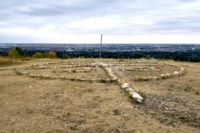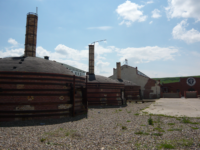Importance of open-mindedness
By Lethbridge Herald Opinon on July 31, 2020.
Consider CO2 contributions from non-human resources in climate debate
Cosmos Voutsinos
Universities are called “higher-learning institutions” because, in addition to their research, their teaching process includes the examination of all sides of a problem, then the professor assists his students to reach a conclusion. This way, the students are learning how to think, instead of what to think, and this enables them to push the envelope of society’s knowledge later.
Professor Roussel, in his July 15 guest column, is dismayed that The Herald would publish an opinion piece with analysis that he does not agree with, and he is attempting an insidious censorship to silence the messenger. His explanation seems to be that CO2 has been rising since the Industrial Revolution and will continue to rise because of human activities – no other reason. He gives not even a passing thought or reference to CO2 contributions from non-human resources. His mind is made up, yet after making several assumptions, his example seems to reach the same conclusion I did: our lockdown savings of CO2 likely had no effect on the rate of CO2 increase in the atmosphere.
In order for the increasing CO2 curve to be rolled back to 2000 or 1990 levels, as Dr. Roussel states, there has to take place a noticeable change, like a reset. The fact that a reset was not detected means that either human-produced CO2 might not be as dominant as the IPCC assumes, or there is a problem with Mauna Loa readings – (delay, error or insignificant signal). The Cape Grim CO2 monitoring station in Tasmania agrees with Mauna Loa’s readings and increases the confidence in the CO2 readings taken by both. This in turn increases the doubt of the relative dominance issue assumed for the anthropogenic CO2.
Reset signals were expected from the data from Mauna Loa, from February to July this year, as the lockdown was progressing. This has not been observed so far, neither instantaneous nor delayed. It makes no difference to such signal if CO2 has been increasing or decreasing. Professor Roussel is correct in believing that humans produce CO2 that causes some warming to our atmosphere. The question is how significant is our contribution relative to other CO2-contributing mechanisms, and how dominant is the CO2 factor relative to some 20 other celestial mechanisms that influence our Earth’s temperature?
In terms of carbon, our environment is divided into four reservoirs: 1) land, 2) atmosphere, 3) shallow seas and 4) deep oceans. These reservoirs don’t behave as if they were isolated, because they continuously exchange carbon from one to the other. Each transfer has its own mechanism and timeframe. The whole system is very complicated with delays and feedbacks that make it difficult to fully understand. Models help us to get an idea, but their predictions cannot be considered as “oracles” because they are “adjustable” according to the biases of the programmer. Within this uncertain picture and without proof, the IPCC assumed that anthropogenic CO2 is the dominant mechanism that controls the Earth’s thermostat. Does Professor Roussel have peer-reviewed and published scientific evidence that supports this IPCC assumption?
Looking at an amplified Mauna Loa curve of CO2 measurements, one can see the reset signals of the naturally occurring seasonal oscillations of CO2 in our atmosphere, in spite of rising CO2. For example, leaves fall from trees and vegetation in October, decay releasing CO2 to the atmosphere. By May, new leaves are growing and absorb CO2 from the atmosphere. In parallel, an opposing oscillation takes place, where a cooling ocean absorbs CO2 in the winter from the atmosphere and a warming ocean in summer releases CO2. These exchanges of carbon involve hundreds of gigatons of CO2 and we can detect them in a timely manner. If the 35 gigatons of annual anthropogenic CO2 represent the most dominant mechanism, why can we not even detect it, like the CO2 from tree leaves? Human and natural CO2 molecules are identical chemically, therefore they must follow the same physics.
I am also dismayed that Professor Roussel does not see the opportunity to fact check the basis for the alleged climate “emergency” and “crisis.” He should be welcoming studies of the atmospheric CO2 levels that better our understanding. Instead he chooses to silence the messenger – a behaviour not in line with the open-mindedness of a higher-learning institution. It is a case of damn the facts, I am right – or perhaps, facts say what I want them to say.
The Lethbridge Herald should be congratulated for publishing consistently all news and views without biases. The topic of climate is complex enough. The last thing we need is falling for the enforced mob rule of groupthink.
Cosmos Voutsinos is a Lethbridge-based professional engineer whose career included work ranging from system designs in the Canadian nuclear industry to construction management of U.S. power plants in Taiwan.
14-13




